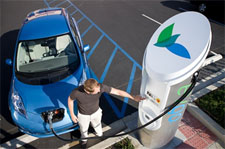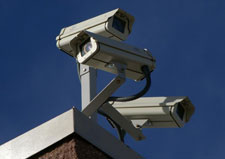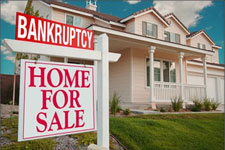Greetings!
This Community Association Update is an example of our commitment to providing the highest quality legal services to our clients and industry partners. If your company or Association would like to see a topic or issue covered in future editions, feel free to call our offices, email us, or submit a question online! | |

| Sincerely,

Steven J. Tinnelly, Esq.
steve@tinnellylaw.com
|
|
New Legislation: SB 880 - EV Charging Stations (Updated)
"Urgency Statute" signed February 29th cleans up SB 209
 In November of last year we discussed the introduction of Senate Bill 209 (SB 209), in our post entitled, "Electric Vehicle Charging Stations in Your Community?" SB 209 as singed into law could be interpreted to broadly require that homeowners associations (Associations) allow electric vehicle (EV) charging stations on common areas--an apparent violation of existing California laws. Our blog post addressed SB 209's various defects and deficiencies, and touched on a report by CAI's Legislative Action Committee ("CLAC") noting the need for an amendment to the law. In November of last year we discussed the introduction of Senate Bill 209 (SB 209), in our post entitled, "Electric Vehicle Charging Stations in Your Community?" SB 209 as singed into law could be interpreted to broadly require that homeowners associations (Associations) allow electric vehicle (EV) charging stations on common areas--an apparent violation of existing California laws. Our blog post addressed SB 209's various defects and deficiencies, and touched on a report by CAI's Legislative Action Committee ("CLAC") noting the need for an amendment to the law.
On February 29, 2012, Senate Bill 880 (SB 880) was signed into law as an "urgency statute." SB 880, effective immediately, is a "clean up" measure intended to (1) correct constitutional flaws posed by SB 209, (2) resolve a conflict with Civil Code Section 1363.07, and (3) correct apparent ambiguities within the language of the statute.
In general, SB 880 operates to:
- Reinforce the right of Associations to place "reasonable" restrictions on the installation of EV charging stations;
- Narrow the scope of the statute to clarify that it applies primarily with respect to parking spaces already designated for the exclusive use of an owner;
- Require the Association to enter into a license agreement with an owner where the EV charging station cannot be placed within the owner's designated parking space;
- Amend Civil Code Section 1363.07 to allow for the granting of exclusive use of common area without a vote of the membership under certain limited circumstances.
For more detailed info about SB 880, click here to read our blog post entitled:
|
|
New Case Law: Glen Oaks Estates v. Re/Max
Fighting Battles on Behalf of their Members: HOA Standing in Lawsuits with Third Parties
 It is easy to understand how HOAs have standing to initiate legal action for enforcement of their governing documents or for damage to common areas. However, under what circumstances may a HOA bring a lawsuit on behalf of its members for claims that the individual members may have against third parties? It is easy to understand how HOAs have standing to initiate legal action for enforcement of their governing documents or for damage to common areas. However, under what circumstances may a HOA bring a lawsuit on behalf of its members for claims that the individual members may have against third parties?
That question was addressed in the recent case of Glen Oaks Estates Homeowners Association v. Re/Max Premier Properties, Inc., (2012) (Glen Oaks), where realtors working on behalf of the developer were sued by the HOA for misrepresenting and concealing material information to the HOA members during the sales process.
To read more about Glen Oaks, click here to read our blog post entitled:
|
|
New Resource: HOA Surveillance Cameras
The Potential Benefits of HOA Surveillance Cameras and Guidelines for Their Use

When used properly surveillance cameras can provide additional security, a greater sense of safety and a deterrent to would be criminals. Yet several questions and considerations are often raised with respect to the installation of surveillance cameras within a HOA: Does it violate the law for a HOA to install surveillance cameras within the community? Are these cameras helpful in reducing criminal activity? Is it acceptable to use "dummy" cameras instead of operative cameras? Does a HOA have to post signs notifying the homeowners that they are under video surveillance?
These are some of the questions that HOAs are asking legal counsel as their Boards consider installing surveillance cameras to monitor entry gates, parking facilities and other common areas. We have published a new resource addressing some of these questions while providing HOAs and community managers with some guidance in this area.
Click here to read our resource entitled:
"Surveillance Cameras within your Association"
|
|
New Resource: Bankrupt Owners in Your Community
Bankruptcy basics and the common issues affecting HOAs

HOAs unfortunately deal with owners overburdened by debt and unable to pay their assessments. These owners may file for bankruptcy to seek financial relief. HOA Boards and management often raise several questions when dealing with these situations: How does this affect a HOA? What must the HOA and its Board be aware of? How can a HOA protect its interests?
We have published a new resource addressing these questions while providing a basic outline of the three types of bankruptcies that HOAs may encounter: Chapter 7, Chapter 11 and Chapter 13.
Click here to read our resource entitled:
"Bankrupt Owners in your Community"
|
 |
|
New TLG Attorney! Kai MacDonald, Esq.
 Tinnelly Law Group is proud to announce it's newest member of the team: Kai MacDonald, Esq. Tinnelly Law Group is proud to announce it's newest member of the team: Kai MacDonald, Esq.
Mr. MacDonald received his undergraduate education at the University of California, Santa Barbara, where he double majored in Philosophy and Law & Society. He received his Juris Doctorate from the University of San Diego, School of Law, in 2008, where he focused on tax law and real estate, and was awarded the Ralph Gano Miller Excellence in Tax Award for outstanding scholarship in tax law.
In 2009 Mr. MacDonald went on to obtain his LLM in Taxation (Masters in Tax Law) from the University of San Diego, School of Law. Mr. MacDonald is also a licensed real estate broker and public notary.
For Mr. MacDonald's full bio, click here. He can be reached at kai@tinnellylaw.com.
Welcome New TLG Clients!
|
|
TINNELLY LAW GROUP
Your Community. Your Counsel.™
|
|
|
|
_______________
SB 880: EV Charging Stations
| |
"...a 'clean up' measure intended to (1) correct constitutional flaws posed by SB 209, (2) resolve a conflict with Civil Code Section 1363.07, and (3) correct apparent ambiguities within the language of the statute."
|
|
_______________
Glen Oaks Estates v. Re/Max
| |
"...these allegations were indeed 'sufficient to show the matter pertains to damage to the common area' so as to confer standing on the HOA to bring the lawsuit on behalf of the Members."
|
|
_______________
HOA Surveillance Cameras
| |
"Dummy cameras are not recommended because they may provide a false sense of security to homeowners who believe that the area is being monitored for security purposes."
|
|
_______________
Owner Bankruptcies
| |
"Improper attempts at collecting debts accrued prior to filing could result in an association being liable for actual and punitive damages."
|
|